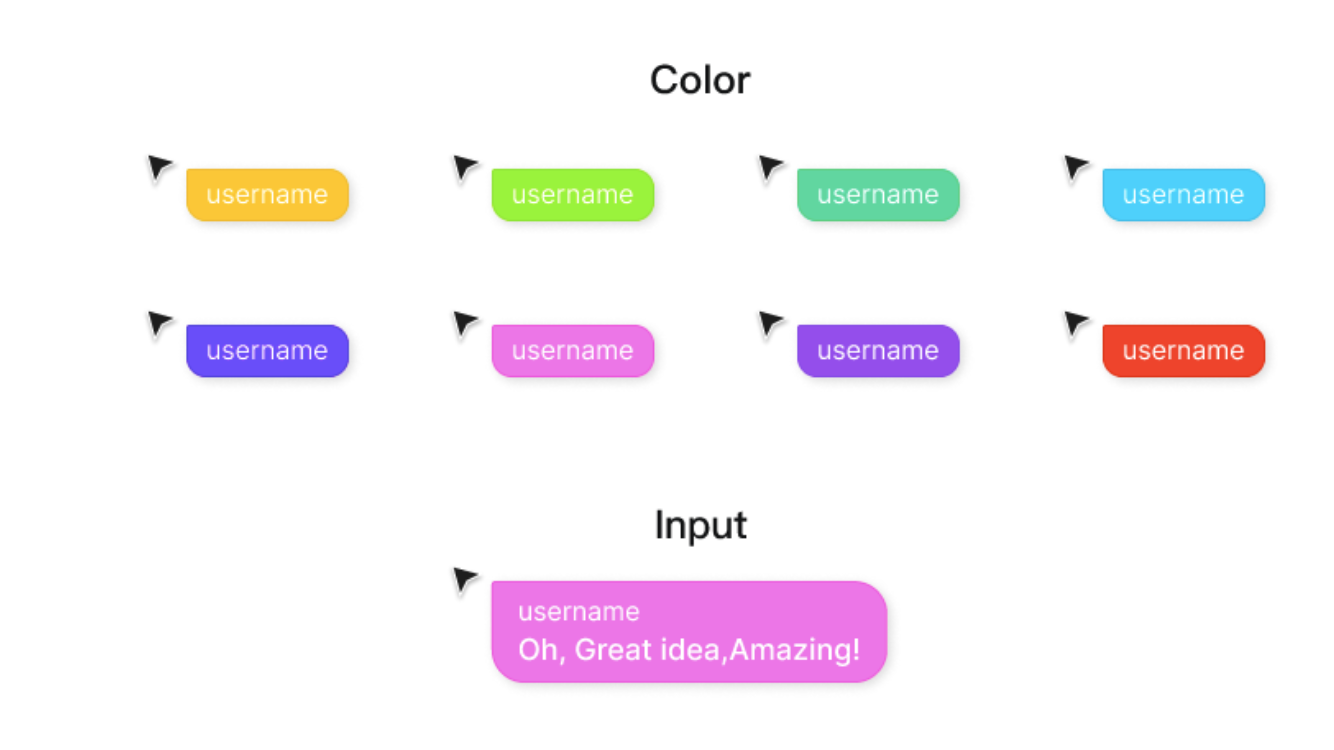A react component helps bring Figma's Cursor Chat to your web applications in less than 3 minutes, making real-time collaboration anywhere. based on Presencejs.
- Press
/to bring up the input box - Press
ESCto close the input box
Online Preview: https://commerce-cursor-chat.vercel.app
Youtube Introduction: https://www.youtube.com/watch?v=28VwErGxn9c
by npm:
$ npm i --save @yomo/react-cursor-chatby yarn:
$ yarn add @yomo/react-cursor-chatby pnpm:
$ pnpm i @yomo/react-cursor-chatLogin with your Github account on https://presencejs.yomo.run, and you will get a free app_id and app_secret.
Then, create a file named .env.local and add the following in it:
APP_ID="abrHlqtooFakeID"
APP_SECRET="nFJqSVzQyhbVgdsBeBojoeJTooFakeSecret"Note - Don't copy the app_id and app_secret examples mentioned above. Replace it with the one that you will see on your screen.
import CursorChat from '@yomo/react-cursor-chat';
// Import theme styles
// import '@yomo/react-cursor-chat/dist/dracula.css';
// import '@yomo/react-cursor-chat/dist/apricot-yellow.css';
import '@yomo/react-cursor-chat/dist/hairy-green.css';
const App = () => {
return (
<div className="main">
<img className="logo" src={logo} alt="logo" />
<p className="tips">
Press <span>/</span> to bring up the input box <br /> Press{' '}
<span>ESC</span> to close the input box
</p>
<CursorChat
presenceURL="https://prsc.yomo.dev"
presenceAuthEndpoint="/api/auth"
avatar="https://cursor-chat-example.vercel.app/_next/image?url=%2Flogo.png&w=256&q=75"
/>
</div>
);
};
ReactDOM.render(<App />, document.getElementById('root'));If react-cursor-chat color matches with your website background color, your users might get confused with it.
There are built-in styles in the @yomo/react-cursor-chat component: apricot-yellow and hairy-green. You should import one of them to use in your web application.
If you want to change it to apricot yellow, just import '@yomo/react-cursor-chat/dist/apricot-yellow.css'.
You can only choose one of them. Then you can see:
Of course you can also override online-cursor-wrapper__tail-box , e.g.
/* The css file in your project */
.online-cursor-wrapper__tail-box {
background-color: #fe6ded; /* Your preferred background color */
}Here are the react-cursor-chat colors you could have :
export default async function handler(req, res) {
if (req.method === 'GET') {
try {
const response = await fetch('https://prsc.yomo.dev/api/v1/auth', {
method: 'POST',
headers: {
'Content-Type': 'application/json',
},
body: JSON.stringify({
app_id: process.env.APP_ID,
app_secret: process.env.APP_SECRET,
}),
});
const data = await response.json();
const token = data.data;
if (token) {
res.status(200).json(token);
} else {
res.status(400).json({ msg: data.message });
}
} catch (error) {
if (typeof error === 'string') {
res.status(500).json({ msg: error });
} else if (error instanceof Error) {
res.status(500).json({ msg: error.message });
}
}
} else {
// Handle any other HTTP method
}
}$ npm run devGet your free dev server account from https://presencejs.yomo.run, add them to Enviroment Variables section to your Vercel Console:
or click this button to try out:
import React from 'react';
import CursorChat from '@yomo/react-cursor-chat';
import '@yomo/react-cursor-chat/dist/hairy-green.css';
// `https://prsc.yomo.dev` is YoMo's free public test service
<CursorChat
presenceURL="https://prsc.yomo.dev"
presenceAuthEndpoint="/api/auth"
avatar="https://avatars.githubusercontent.com/u/67308985?s=200&v=4"
/>;presenceURL: string: to set the YoMo's service address.presenceAuthEndpoint: string: to set api for getting access tokenroom?: string: to set room.showLatency?: boolean: to show connected mesh server and the end-to-end latency.avatar?: string: to set avatar.name?: string: to set name.
import React, { useMemo } from 'react';
import { useOnlineCursor, useRenderPosition } from '@yomo/react-cursor-chat';
import CursorIcon from './CursorIcon';
import './your-style.css';
// You can customise the content of your own mouse block
const MeCursor = ({ cursor }) => {
const refContainer = useRenderPosition(cursor);
return useMemo(
() => (
<div className="cursor" ref={refContainer}>
<CursorIcon color={cursor.color} />
{cursor.name && <div>{cursor.name}</div>}
{cursor.avatar && (
<img className="avatar" src={cursor.avatar} alt="avatar" />
)}
</div>
),
[]
);
};
// You can customise what other people's mouse blocks can display
const OthersCursor = ({ cursor }) => {
const refContainer = useRenderPosition(cursor);
return (
<div ref={refContainer} className="cursor">
<CursorIcon color={cursor.color} />
{cursor.name && <div>{cursor.name}</div>}
{cursor.avatar && (
<img className="avatar" src={cursor.avatar} alt="avatar" />
)}
</div>
);
};
// Exporting your custom components
const YourComponent = ({
presenceURL,
presenceAuthEndpoint,
room,
name,
avatar,
}) => {
const { me, others } = useOnlineCursor({
presenceURL,
presenceAuthEndpoint,
room,
name,
avatar,
});
if (!me) {
return null;
}
return (
<div className="container">
{others.map(item => (
<OthersCursor key={item.id} cursor={item} />
))}
<MeCursor cursor={me} />
</div>
);
};




